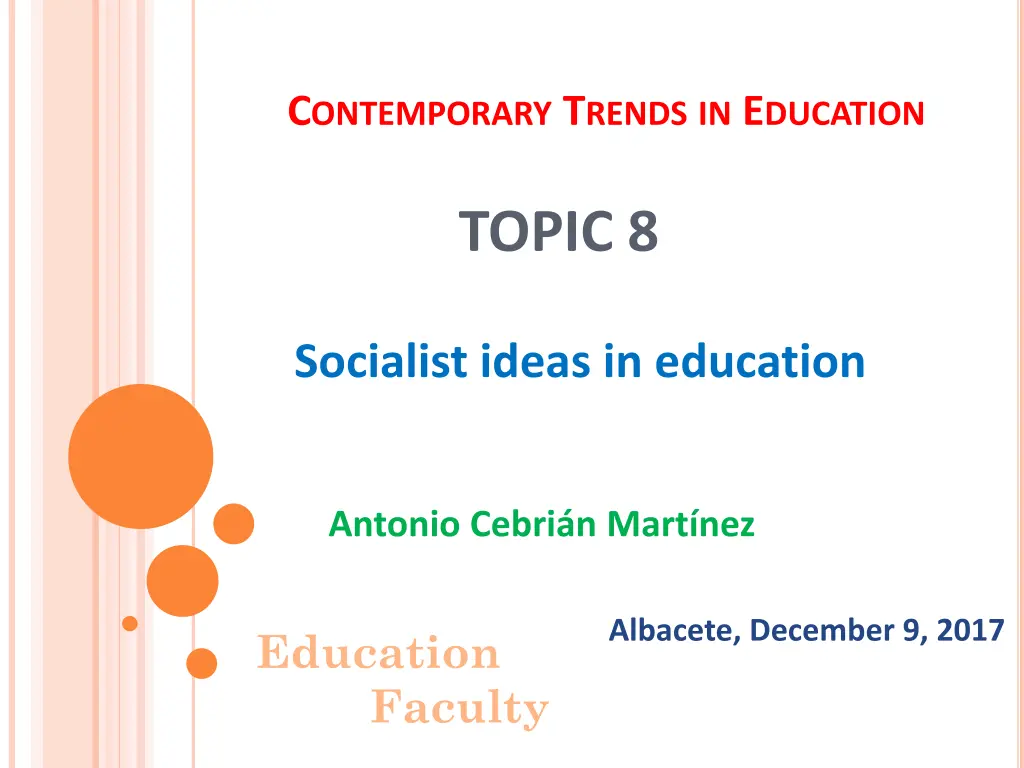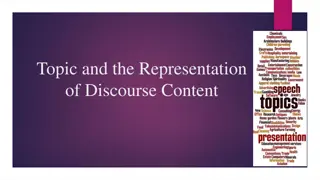
Understanding Socialist Pedagogy in Education: Origins and Framework
Explore the origins and historical framework of Socialist Pedagogy, tracing back to influential figures like Plato, Marx, and Engels. Learn about the evolution of socialist ideas in education, from Utopian Socialism to practical implementations like the Single School of Labor. Discover how individuals like Owen and Fourier contributed to the development of socialist educational principles.
Download Presentation

Please find below an Image/Link to download the presentation.
The content on the website is provided AS IS for your information and personal use only. It may not be sold, licensed, or shared on other websites without obtaining consent from the author. If you encounter any issues during the download, it is possible that the publisher has removed the file from their server.
You are allowed to download the files provided on this website for personal or commercial use, subject to the condition that they are used lawfully. All files are the property of their respective owners.
The content on the website is provided AS IS for your information and personal use only. It may not be sold, licensed, or shared on other websites without obtaining consent from the author.
E N D
Presentation Transcript
CONTEMPORARY TRENDS IN EDUCATION TOPIC 8 Socialist ideas in education Antonio Cebri n Mart nez Albacete, December 9, 2017 Education Faculty
INDEX 1. Introduction: origin and historical framework of Socialist Pedagogy 2. Constitution of Socialist Pedagogy: Ideas 3. Implantation of Socialist Pedagogy: the school institution 3.1. The Single School of Labor: theoretical design 3.2. The Single School of Labor in practice: experiences of Makarenko
1. INTRODUCTION: THE ORIGIN AND HISTORICAL FRAMEWORK OF SOCIALIST PEDAGOGY Beginnings in Plato and maturity with Marx and Engels Man as a social being and primacy of the community Consequence of the Industrial Revolution (second half XVIII Century) Modernization: Social transformations: agrarian society to urban and industrialized Economic liberalism and capitalism (monetary yield) Consequences: low wages, strenuous working hours, child exploitation, overcrowding, poor hygiene and illiteracy Utopian Socialism: Building ideal societies through education France and Great Britain Egalitarian communities, self-sufficient and without social classes or private property General and specialized training for workers Owen and Fourier
1. INTRODUCTION: THE ORIGIN AND HISTORICAL FRAMEWORK OF SOCIALIST PEDAGOGY Owen: Theoretically design a "socialist" society Man is the fruit of his external and controllable "circumstances" Social reconstruction before individual education Sought to change working circumstances School inside the factory with two levels: 2-6 years and 6-14 years (intellectual training and agricultural and domestic manual labor) Two innovations: Professional preparation expands to train for various professions and trades Combining teaching with productive work
1. INTRODUCTION: THE ORIGIN AND HISTORICAL FRAMEWORK OF SOCIALIST PEDAGOGY Fourier: Phalanges: cooperative communities ideal for social reconstruction Education occupies a fundamental place Social units presided over by harmony Integral character: education of the body and the intellect, linking children's capacities to productive work From the age of 3, progressive introduction of the child to the different social and labor activities Beginning in 1840, a stronger and coordinated movement of workers to improve working conditions and achieve a more just society 1848: Communist Manifest of Marx and Engels
2. CONSTITUTION OF SOCIALIST PEDAGOGY: IDEAS Scientific socialism: scientific character to include the interpretation of the dialectic of historical development Mode of production or economic structure of a society determines the superstructure of other institutions and social practices Economic base of the society has two components: Forces of production or technological development Relations of production or relations between social classes Class conflict: bourgeois or owners against proletariat or labor To achieve a classless or communist society Disappearance of private property, elimination of social classes and domination and individual development only in community with others
2. CONSTITUTION OF SOCIALIST PEDAGOGY: IDEAS Child outside the society would remain in an animal state Humanization: becoming a man within society and linked to work "New man": a man capable of participating in any phase of productive work in a "new society" Transformation of society through cooperative and work-focused education Fight against child exploitation and full-time work of children in factories Polytechnic education or combination of education with material production Generalization of the construction of schools within the factories Polyvalent training for the preparation of any trade (contrary to the Industrial Revolution), avoiding child exploitation and making the man feel more complete
2. CONSTITUTION OF SOCIALIST PEDAGOGY: IDEAS Educational content of socialist teaching: Intellectual education Marx overcomes the traditional duality of mind and body including as a third factor technological teaching Technological training in all production processes Physical education
2. CONSTITUTION OF SOCIALIST PEDAGOGY: IDEAS From the age of 9 each child had to become a productive worker, receiving in parallel an integral teaching PURPOSE: SOCIALIST PEDAGOGY Formation of the "total man" who identifies with that "new man" capable of developing all his physical and intellectual abilities, dominates and is not dominated by the processes of production, which controls and can transform social reality
3. IMPLEMENTATION OF SOCIALIST PEDAGOGY: THE SCHOOL INSTITUTION Marx and Engels did not design a practical school model Lack of confidence in the consideration of school as a means of social transformation Focused on bourgeois interests Radical change in the first decades of century XX thanks to the Russian Revolution of 1917 First world-wide field of experiences of the Marxist principles It raised the need to consolidate the socialist model through the school It also helped the prevailing pedagogical optimism and the consideration of the school as an alternative to the class conflict and the means to achieve social equality and the reconstruction of a more just society
3. IMPLEMENTATION OF SOCIALIST PEDAGOGY: THE SCHOOL INSTITUTION 3.1. The Single School of Labor: theoretical design Born in 1918 Socialist school drawn after the Russian Revolution Base of the Russian school system Its configuration includes two factors: Marxist theory of polytechnic education (theoretical postulates) Concept of single or unified school, equality between social classes (practical postulates of the New School) Education for all, compulsory, free, mixed and secular School as "model of the future society without classes" Comprehensive training based on active teaching methods (New School) Combining teaching with socially productive work, school institution as an "industrial school", a "child labor community" Seek utility for the community, formative value of socially useful work
3. IMPLEMENTATION OF SOCIALIST PEDAGOGY: THE SCHOOL INSTITUTION 3.1. The Single School of Labor: theoretical design (below) Blonskij: He intends to theoretically design the structure and curriculum that this institution should have Three equal and common educational levels for all children: SCHOOL OF LABOR FOR TEENS ELEMENTARY SCHOOL OF LABOR CHILD CARE CENTER 14 to 18 years, labor integration in the factory and studies of Social History and Philosophy 3 to 7 years, observation and games of imitation of the adult tasks 8 to 13 years, domestic activities and agricultural work and in the workshops He tried to combine the ideas of the New School (two first levels) with the Marxist conception (third level) Education as the most appropriate way to create the socialist "new man"
3. IMPLEMENTATION OF SOCIALIST PEDAGOGY: THE SCHOOL INSTITUTION 3.2. The School of Labor in practice: experiences of Makarenko Most famous Russian pedagogue Put into practice the Marxist ideas of union between education and productive work Pedagogical action opposed to Rousseauian ideals Pedagogy based on the order, discipline, rigor and ideological conformation of the Soviet "new man" Commune as an educational institution in which students live and work and study Inculcated the importance and necessity of study Active methods alternating half working day half study Mural newspapers collected the productions made He promoted a system of detachments and heads of militarist court A lot of discipline in order to achieve inner self-discipline The colonists were allowed access to the governing and management bodies
3. IMPLEMENTATION OF SOCIALIST PEDAGOGY: THE SCHOOL INSTITUTION 3.2. The School of Labor in practice: experiences of Makarenko (below) Four preoccupations sign his pedagogical actuation: Absolute conviction that through education the "new communist man" was to be formed, learning from his own practice Consideration that the "new communist man" was the "collective man", education might be done within and for the community Marxist conception about the educational value of socially useful productive work, group membership and self- sufficiency of the colony Importance that gave authority and discipline, capital importance of the role of the teacher to organize the community, corporal punishment if it was necessary




















